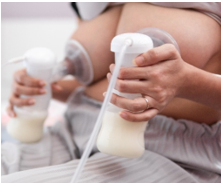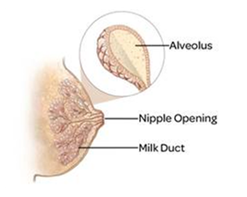Breast milk is much more than food and breast feeding is much more than a method of feeding!
What to expect
Breast milk is vitally important for preterm and ill babies and is extremely important for all parents who have, or are likely to have, a preterm or ill baby.
A discusion will take place with the parents as early as possible about the value of breast milk.
Midwives will inform NICU (Neonatal Intensive Care Unit) when a pregnant woman may have a preterm or ill baby to enable preparation conversations.
Upon admission, breast milk and expressing is part of the admission procedure for every baby. We have found that many parents who may not have considered breast feeding, will be open to providing breast milk once they are provided more information and can understand it’s full value to their preterm baby.

Why is breast milk important?
Families can give colostrum regardless of how they are choosing to feed their baby - every drop counts.
Breast milk is important because:
- It is a natural medicine that only you can provide for your baby
- It contains all the nutrients needed to optimize growth, brain development, along with the hormones stimulated by the body
- It helps to keep your baby healthy
- It is packed with protective factors
- It provides concentrated nutrition
Things to remember about Colostrum – the ‘Gold Dust’:
- It has strong anti-inflammatary factors
- It stimulates gut growth
- Small volumes – quality not quanity
- It has a laxative effect which helps to clear meconium
- It is really important for a baby’s immune system

Nutrition, Protection and Comfort
- Allergies
- Gastroenteritus
- Ovarian cancer
- Ear infections
- Urinary tract infection
- Diabetes
- Obesity
- Breast cancer
- Childhood leukeamia
- Postnatal depression
- SIDS (Sudden Infant Death Syndrome)
- Respiratory disease
- ROP (Retinopathy of Prematurity)
- Infections
- NEC (Necrotising enterocolitis)
To find more information please follow the link to the National Perinatal.org feeding awareness website: https://www.nationalperinatal.org/feeding-our-babies
Milk production
Milk production relies on two hormones; Prolactin and Oxytocin.
Prolactin
Prolactin starts from early in pregnancy by telling your breasts to make milk, ready for expressing BUT is effective by other hormones. If your baby is born prematurely, you can still make breast milk.
When milk is expressed, Prolactin continues to be produced. Without draining the breast, milk production is reduced and eventually stops.

Oxytocin
Oxytocin is released when you express (ideally next to your baby). Muscular cells within the breast squeeze milk that is ready down the ducts (tubes) to the nipple. This is called the ‘milk ejection reflex’.
Effective expressing within the first two weeks further develops the milk making cells to help you produce milk long term.
Golden tips for golden drops
On our NICU the aim is to give babies colostrum within 6 to 24 hours after birth.
1. Mother’s own milk reduces NEC (Necrotising enterocolitis - a serious bowel infection) and sepsis. It also improves brain development.
2. Expressing colostrum within two hours of delivery, improves milk volumes.
3. Gently massage each breast for a short time before pumping.
4. Expressing milk should be comfortable – have you got the correct size funnels?
5. Try to double pump while expressing as this saves time and increases milk volume.
6. Try to keep the ‘power’ of the breast pump within your comfort zone.
7. Hand expressing before and after pumping can help to stimulate prior and collect the higher fat milk content at the end.
8. Try and drain the breast as much as possible to increase milk production
9. Try to express at least 8 to 10 times in 24 hours and at least once between midnight and 5am, with no long gaps.
10. If you are expressing on the Postnatal Ward, please ensure your milk is stored in the NICU fridge.
11. Every drop of a mother’s milk is precious and can be used.
12. Breast milk is used for mouth care and analgesia too.


